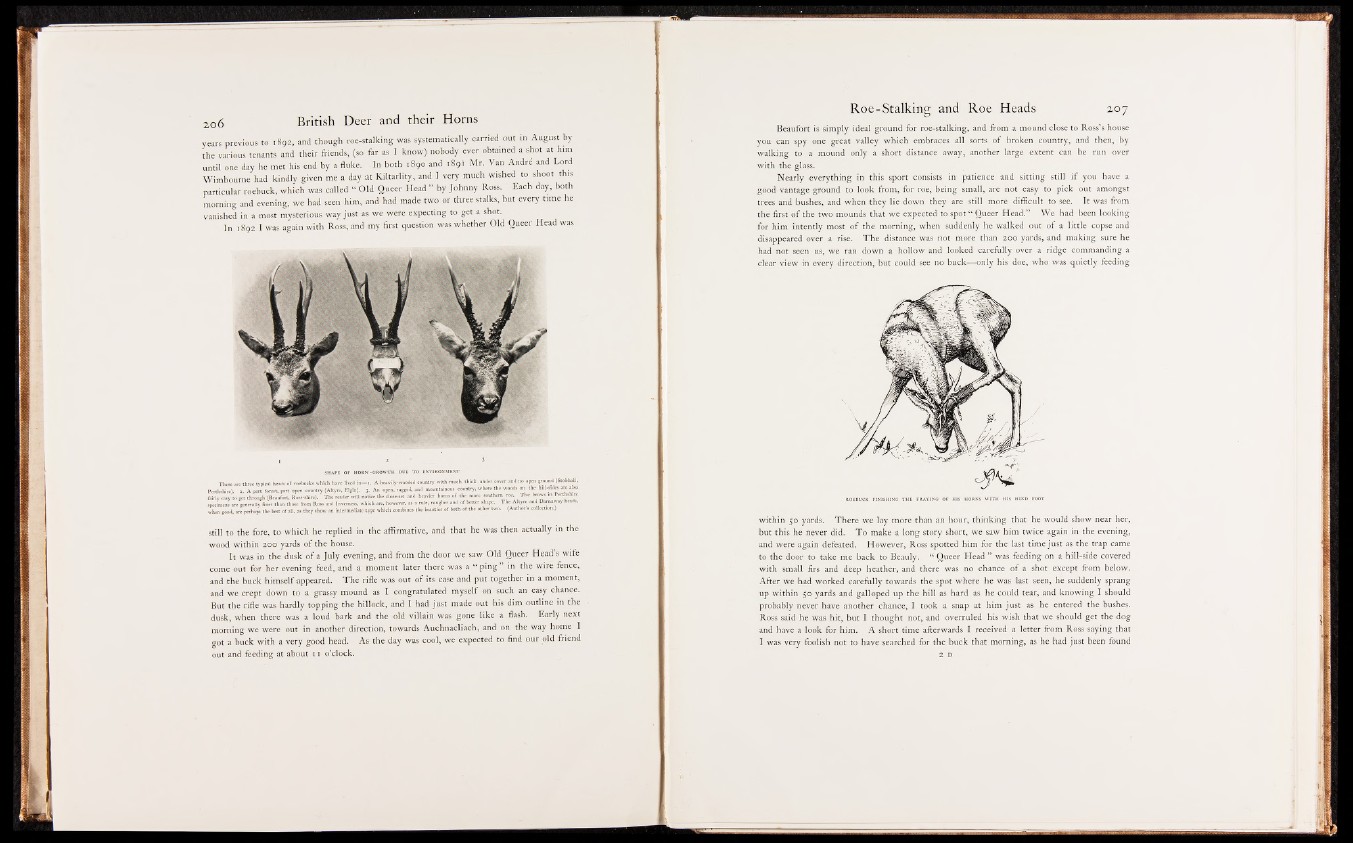
years previous to 1892, and though roe-stalking was systematically carried out in August by
the various tenants and their friends* J | far as I know) nobody ever obtained a shot at him
until one day he met his eri!)by a fluke. In both i8 9o'and: *891 Mr. Van Andrd and Lord
Wimbourne had kindly given me a day at Kiltarlity, ami I very much wished to shoot this
particular roebuck, which was called “ Old Queer Head*’ b y Johnny R o l f Each day, both
morning and evening, we had seen him, and had made two or three stalks,/but every time he
vanished in a most mysterious way Just as we were expecting to get a shot. /
In 1892 I was again with Ross, ami my first question was whether Old Queer Head was
These are three typical heads of roebucks which have lived in—1. A heavily-wooded country with much thick under cover and no open ground (Stobhall,
Perthshire), a. A part forest, part open country (Altyre, Elgin). 3. An open, rugged, and mountainous country, where the woods “ T T *
fair|y easy to get through (Beaufort, Ross-shire). The reader will notice the close-set and heavier horns of the more southern roe. The brows in Perthshire
specimens arc generally finer than those from Ross and Inverness, which are, however, as a rule, rougher and of better shape. The Altyre and Darnaway heads,
when good, are perhaps the best of all, as they show an intermediate type which combines the beauties of both of the other two. (Author s collection.)
still to the fore, to which he replied in the affirmative, and that he was then actually in the
wood within 200 yards o f the house.
It was in the dusk o f a July evening, and from the door we saw Old Queer Head s wife
come out for her evening feed, and a moment later there was a “ ping in the wire fence,
and the buck himself appeared. T h e rifle was out o f its case and put together in a moment,
and we crept down to a grassy mound as I congratulated myself on such an easy chance.
But the rifle was hardly topping the hillock, and I had just made out his dim outline in the
dusk, when there was a loud bark and the old villain was gone like a flash. Early next
morning we were out in another direction, towards Auchnacliach, and on the way home I
got a buck with a very good head. As the day was cool, we expected to find our old friend
out and feeding at about 11 o’clock.
Beaufort is simply ideal ground for roe-stalking, and from a mound close to Ross’s house
you can spy one great valley which embraces all sorts o f broken country, and then, by
walking to a mound only a short distance away, another large extent can be run over
with the glass.
Nearly everything in this sport consists in patience and sitting still i f you have a
good vantage ground to look from, for roe, being small, are not easy to pick out amongst
trees and bushes, and when they lie down they are still more difficult to see. It was from
the first o f the two mounds that we expected to spot“ Queer Head.” We had been looking
for him intently most o f the morning, when suddenly he walked out o f a little copse and
disappeared over a rise. The distance was not more than 200 yards, and making sure he
had not seen us, we ran down a hollow and looked carefully over a ridge commanding a
clear view in every direction, but could see no buck— only his doe, who was quietly feeding
within 50 yards. There we lay more than an hour, thinking that he would show near her,
but this he never did. T o make a long story short, we saw him twice again in the evening,
and were again defeated. However, Ross spotted him for the last time just as the trap came
to the door to take me back to Beauly. “ Queer Head ” was feeding on a hill-side covered
with small firs and deep heather, and there was no chance o f a shot except from below.
After we had worked carefully towards the spot where he was last seen, he suddenly sprang
up within 50 yards and galloped up the hill as hard as he could tear, and knowing I should
probably never have another chance, I took a snap at him just as he entered the bushes.
Ross said-he was hit, but I thought not, and overruled his wish that we should get the dog
and have a look for him. A short time afterwards I received a letter from Ross saying that
I was very foolish not to have searched for the buck that morning, as he had just been found